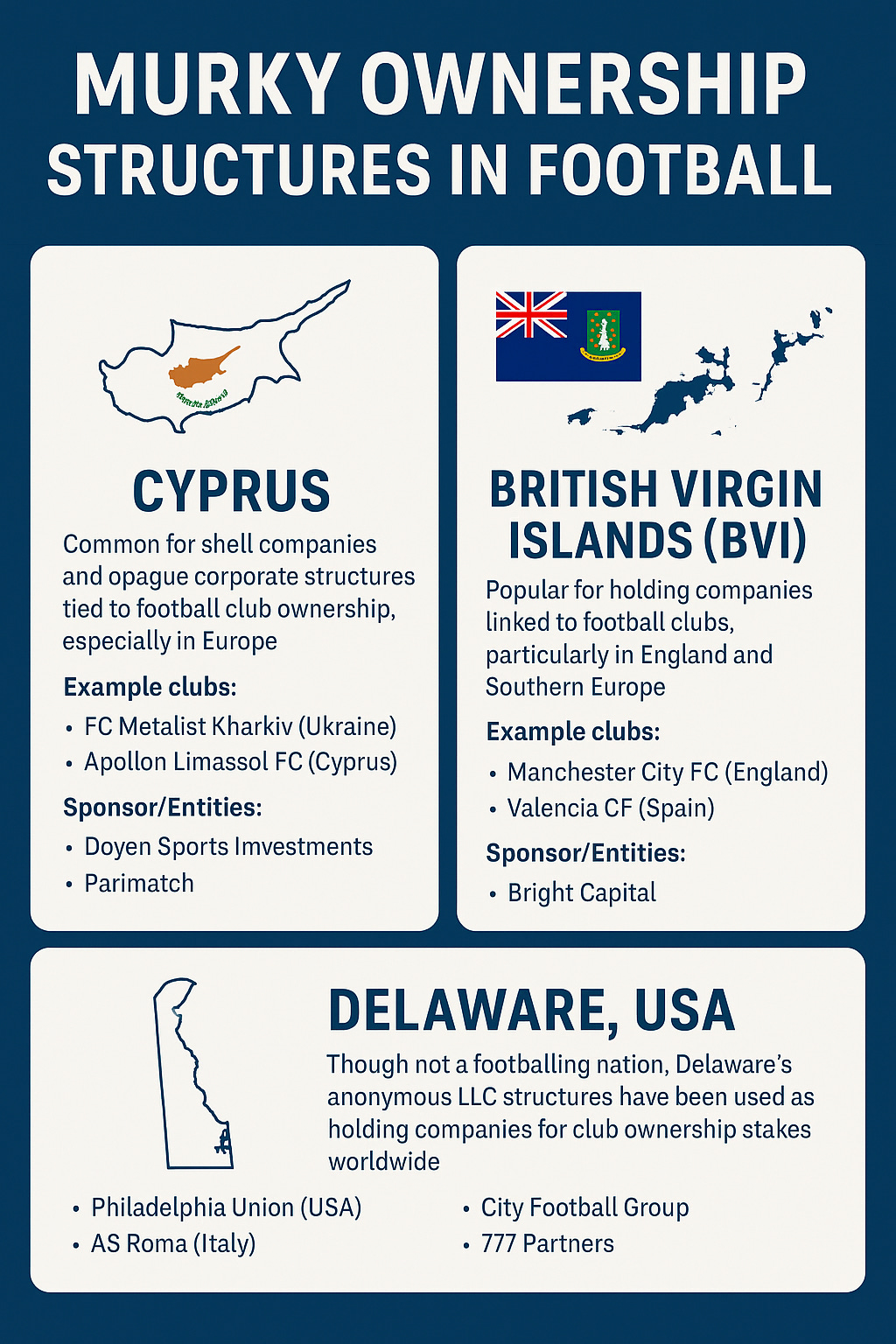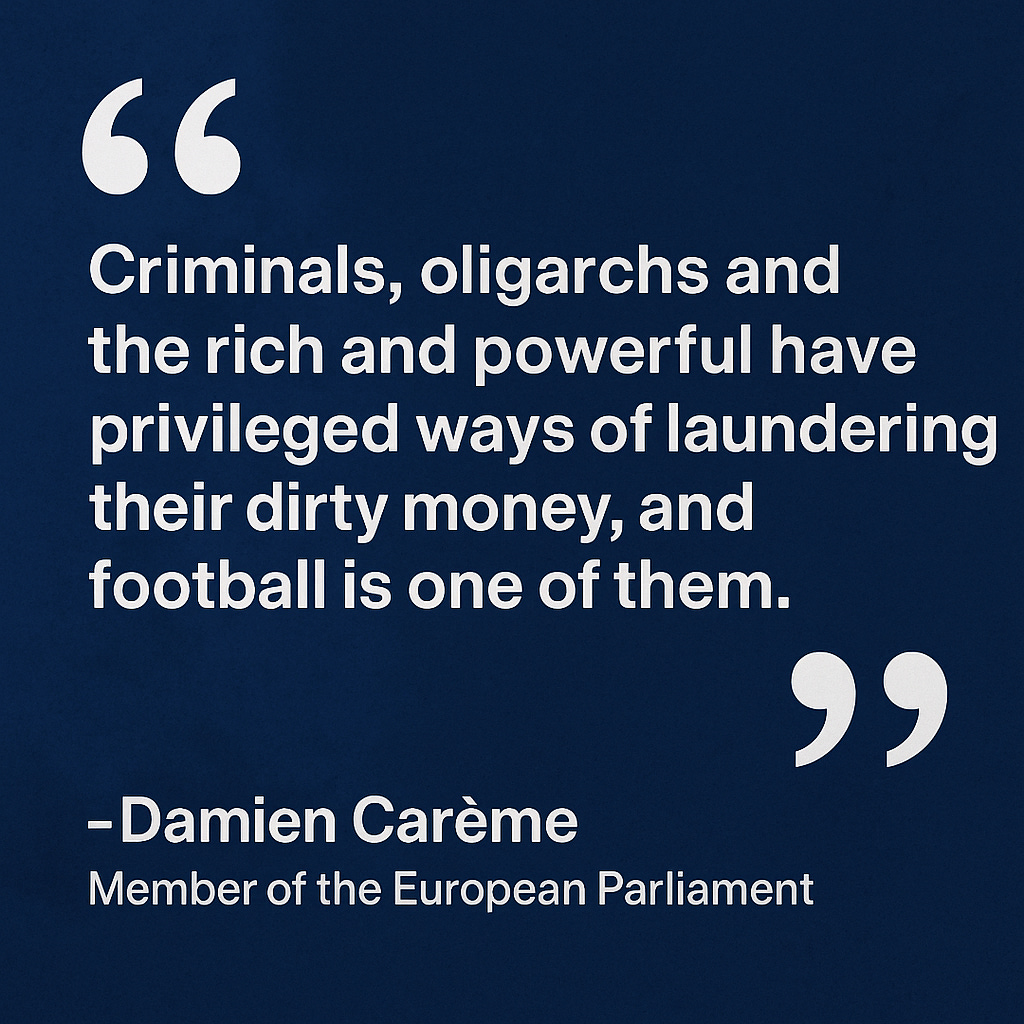Issue #20 – How Global Football Is Used to Launder Dirty Money
Polar Insider | Issue #20 | Week of 16 July 2025
🧊 Introduction
Hi there,
Welcome to this week’s edition of Polar Insider. In this issue, we delve into the murky intersection of global football and financial crime, exploring how the world’s most beloved sport is exploited to launder dirty money.
Here’s what’s inside:
📌 Top Story – How Global Football Is Used to Launder Dirty Money
🔎 Case Studies – Real Zaragoza & Romanian Transfer Fraud
🌍 Regulatory Roundup
🧰 Compliance Toolkit – Resources on Sports & AML
📌 Top Story
How Global Football Is Used to Launder Dirty Money
Football, a multi-billion-dollar global industry, has become a prime target for financial crime. Criminals exploit its vast cash flows, complex ownership structures, and lax oversight to launder illicit funds. The United Nations estimates that $140 billion is laundered through football annually, threatening the sport’s integrity and exposing financial institutions to significant risks.
🎥 Prefer to watch? Catch the 90-sec explainer:
Key Methods of Laundering in Football
1. Murky Ownership Structures
Opaque corporate networks and offshore shell companies obscure the true owners of many clubs, enabling criminals to hide their involvement. Common destinations for such structures include:
Cyprus: Known for shell companies tied to European clubs, leveraging its flexible tax regime.
British Virgin Islands (BVI): Popular for anonymous holding companies linked to clubs in England and Southern Europe.
Delaware, USA: Anonymous LLCs are increasingly used as investment vehicles for club ownership worldwide.
2. Inflated Player Transfers
Overpriced player transfers serve as a façade to inject illicit funds. For example, UEFA’s Financial Fair Play (FFP) investigations into Paris Saint-Germain (PSG) highlighted inflated sponsorship deals linked to Qatar-backed entities. While no criminal laundering was proven, the case mirrored laundering patterns:
Inflated sponsorships channeled funds through the club.
Overstated player values masked the origins of funds.
3. Shell Clubs & Fake Sponsorships
Fraudsters acquire financially weak clubs and funnel illicit cash through fake sponsorship deals. These transactions blur the line between legitimate income and laundered funds.
4. Criminal Syndicate Involvement
Organized crime groups infiltrate football through match-fixing and gambling schemes. For instance, the Calcio Scommesse scandal in Italy (2011–2015) revealed how syndicates bribed players and officials to fix matches, laundering betting profits through payouts.
🔎 Case Study
The Case of Real Zaragoza – Money Laundering Allegations in Spanish Football
Summary:
In 2011, Real Zaragoza faced allegations of laundering funds to fix a crucial La Liga match against Levante UD. Prosecutors claimed Zaragoza executives disguised over €1 million in bribes as bonus payments to Levante players, ensuring Zaragoza’s victory and avoiding relegation.
What Happened:
Pretext: Facing relegation, Zaragoza allegedly funnelled funds labelled as “bonuses” or salaries to Levante players via their own players.
Execution: Bribes were disguised as legitimate payments in financial ledgers, ensuring Levante underperformed in the match.
Discovery & Aftermath: Irregular transactions flagged by Spanish tax authorities led to an investigation implicating 40+ individuals, including high-profile players. Most were acquitted in 2019 due to insufficient evidence, but the case exposed weak financial controls in football.
Key Lessons for Financial Crime Teams:
🚨 Watch for Unusual Salary and Bonus Payments: Scrutinize payroll structures, especially near key matches.
🔐 Cross-Match Sporting Events with Financial Activity: Use event-driven alerts to flag suspicious financial spikes around high-stakes games.
🧱 Integrate Sports Integrity Intelligence into AML Monitoring: Collaborate with sports integrity units and regulators to connect financial and sporting irregularities.
The Case of Romanian Football Transfer Fraud (2014)
Summary
In 2014, eight Romanian football executives, club owners, and agents were convicted of tax evasion and money laundering tied to fraudulent player transfers. The scheme, involving inflated fees and shell companies, cost the Romanian government approximately €1.7 million in lost tax revenue.
What Happened
Pretext: Transfers were orchestrated with inflated fees, often involving obscure clubs in Cyprus as intermediaries.
Execution: Illicit funds were routed through offshore entities and cycled back into Romanian club accounts, disguised as legitimate income.
Discovery & Aftermath: Forensic analysis of player contracts and financial records revealed links to shell companies and undeclared revenues. Eight individuals received prison sentences, and authorities recovered lost tax revenue.
Key Lessons for Financial Crime Teams
🚨 Scrutinize Unusually High Fees: Flag payments exceeding market rates, especially via intermediaries in low-transparency jurisdictions.
🔍 Verify Player Valuations: Benchmark transfer fees against independent valuation tools to detect discrepancies.
🔐 Monitor Agent and Intermediary Activity: Investigate agents repeatedly involved in unusual transfers and their ties to offshore entities.
🌍 Cross-Border & Entity Checks: Apply enhanced due diligence (EDD) for transactions involving jurisdictions like Cyprus.
🌍 Regulatory Roundup
🇺🇸 North America
FinCEN Targets Sports Entities: U.S. regulators are expanding AML scrutiny to sports betting and professional franchises, urging financial institutions to flag suspicious transactions tied to clubs or events.
Crypto AML Guidance: With the rise of fan tokens and crypto sponsorships, regulators emphasize enhanced KYC for crypto exchanges and monitoring of virtual assets linked to sports.
🇪🇺 Europe
EU’s AMLD6: By 2029, professional clubs and player agents will be classified as “obliged entities,” requiring them to verify customer identities, monitor transactions, and report suspicious activity.
Asset Seizure Powers: France and Germany are enhancing their ability to freeze and confiscate assets linked to money laundering, including suspicious club investments.
🇦🇺 🇭🇰 Asia-Pacific
AUSTRAC’s Betting Crackdown: Australia’s financial crime regulator is tightening controls on sports betting companies and sponsorship deals to prevent them from being used as laundering channels.
Hong Kong’s AML Priorities: Authorities are focusing on beneficial ownership transparency and monitoring virtual asset platforms tied to sports sponsorships.
🧰 Compliance Toolkit
Equip yourself with these resources to tackle financial crime in sports and gaming effectively:
Transparency International – Global Corruption Report: Sport – Comprehensive analysis of corruption and money laundering risks in football and other sports, with reform recommendations for better governance.
📎 Link → https://www.sportsintegrityinitiative.com/summary-transparency-internationals-global-corruption-report-sport/FATF – Money Laundering through the Football Sector – Official report by the Financial Action Task Force detailing how criminals exploit football clubs, player transfers, and betting, with case studies and risk indicators.
📎 Link → https://www.fatf-gafi.org/en/publications/Methodsandtrends/Moneylaunderingthroughthefootballsector.htmlSumsub Blog – How Money Is Laundered Through Football – Overview from compliance tech experts on laundering techniques like inflated fees, image rights, and betting scams, plus mitigation strategies.
📎 Link → https://sumsub.com/blog/money-laundering-football/
💬 Quote of the Week
🎁 Bonus for Subscribers




